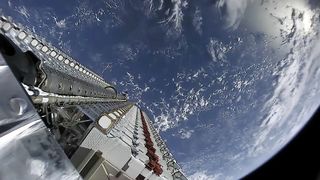SpaceX makes rare acquisition of satellite start-up Swarm – here’s what it means
SpaceX likes to keep things in-house – it's why it's so successful

SpaceX is moving to buy out Swarm, a smaller satellite startup, in a rare acquisition for the private space company founded by Elon Musk. Typically, SpaceX does not buy or merge with other companies, making the offer to buy Swarm highly unusual – though on paper it's doesn't look like a bad idea.
According to CNBC, Swarm does not have nearly the number of satellites in orbit that SpaceX does, but it does have FCC licenses that will now be transferred over to SpaceX once the deal is finalized and Swarm becomes a "direct wholly-owned subsidiary of SpaceX."
The terms of the deal haven't been disclosed but an earlier valuation put Swarm's worth at roughly $85 million. It only has 120 of its SpaceBEE satellites in orbit, and those are comparatively tiny next to SpaceX's Starlink satellites.
- Everything you need to know about SpaceX's Starlink and 'space internet'
- Elon Musk says Starlink internet speeds will double to 300Mbps
- SpaceX: everything you need to know
Starlink is SpaceX's side hustle when it's not ferrying other people's satellites into orbit or bringing cargo – and now people – to the International Space Station. Starlink is a planned network of thousands of satellites that will provide satellite broadband internet access to nearly every point on the Earth.
Satellite internet is nothing new, of course, but satellites aren't stationary above the Earth's surface and move too fast for it to provide a reliable, stable internet connection, so are typically reserved for specialized equipment that doesn't need constant access but needs a connection in a remote location where infrastructure is non-existent.
Starlink's solution to this problem is essentially to surround the Earth in a giant shell of connected satellites so that even if one satellite passes out of the line of sight necessary to maintain a connection, another satellite in the network will be close enough behind it to pick up where it left off, providing a reliable connection wherever you are on the Earth's surface (so long as you can see the sky, that is).

This is a pretty audacious plan, honestly, and SpaceX looks as committed to Starlink as it is to the ISS and the government contracts that keep the company flush with cash.
Get daily insight, inspiration and deals in your inbox
Get the hottest deals available in your inbox plus news, reviews, opinion, analysis and more from the TechRadar team.
Starlink isn't without its issues, especially for astronomers and stargazers who now have thousands of shiny satellites streaking across the sky, ruining carefully planned telescopic observations and interfering with our view of the stars beyond.
This is one of the reasons why licenses for satellites exist. Musk, who is notoriously prickly when it comes to government interference certainly sees value in side-stepping the red tape involved in getting new or modified FCC licenses for Starlink satellites if he can and might have come to the conclusion that simply buying other people's licenses is more efficient.
While this might be the case, we genuinely hope it's not. Tech company consolidation over the past decade has led to an absolute stifling of competition and, frankly, innovation.
We now live in a world where "entrepreneurs" and startup founders' only goal seems to be to grow big enough to get noticed by one of the dozen or so tech giants like Apple, Uber, or Facebook and get bought out to the tune of hundreds of millions, if not billions, of dollars. And there's growing evidence that all of these acquisitions aren't producing innovation but suffocating it.
For all the complaints one might have of Elon Musk and SpaceX, they have not followed this kind of insatiable, gobble-up-anything-that-remotely-looks-like-money path to growth.
If anything, they've done it the good old-fashioned American way and gorged on a steady stream of government contracts from NASA and the US Department of Defense. But SpaceX has also built an exceptional team of dedicated scientists and engineers who are in it for the right reasons, at least.
And, honestly, it's working. SpaceX has a clear runway cushioned by fat piles of government money that allows it to take risks, innovate, and do great things. Elon Musk, to his credit, has given SpaceX engineers plenty of room to try things even if it fails. Rockets blowing up on launch pads are greeted with laughter and sometimes cheers, not horror and recrimination.
It would honestly be a major mistake for the company to let itself get off track at this stage by short-cutting the process through acquisition. The company's hard work has paid major dividends to date, so anything that isn't what they've been doing already is going to be inherently risky.
SpaceX said that their interest in Swarm is "access to the intellectual property and expertise developed by the Swarm team." Maybe it's nothing, and we genuinely hope it is. If Swarm's engineers and personnel are experts in their field, then SpaceX would be smart to take them on to help with Starlink. But if this acquisition is more about paperwork and impatience, then we would definitely be worried. Impatience and rocket science do not mix.
Swarm is one small company. An $85 million valuation is probably less than the cost of the rocket fuel SpaceX has used in the past two years, so this isn't likely to be a big deal in the grand scheme of things. But when you're up at the start of the fourth quarter, complacency is an easy way to lose the game.
Even if it's just one small satellite startup, there will always be another startup founder around the corner, ready to put a price on their company's unique product, service, algorithm, or government license. This kind of acquisition quicksand would be a disaster for SpaceX and should be avoided at all costs, no matter how attractive the offer or how much red tape it promises to avoid.
- Stay up to date on all the latest tech news with the TechRadar newsletter

John (He/Him) is the Components Editor here at TechRadar and he is also a programmer, gamer, activist, and Brooklyn College alum currently living in Brooklyn, NY.
Named by the CTA as a CES 2020 Media Trailblazer for his science and technology reporting, John specializes in all areas of computer science, including industry news, hardware reviews, PC gaming, as well as general science writing and the social impact of the tech industry.
You can find him online on Threads @johnloeffler.
Currently playing: Baldur's Gate 3 (just like everyone else).
